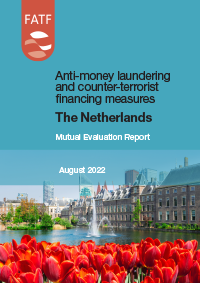Technical Compliance
Ratings which reflect the extent to which a country has implemented the technical requirements of the FATF Recommendations.
Netherlands - Mutual Evaluation 2022
- R.1 - Assessing risk & applying risk-based approach
- LC
- R.2 - National cooperation and coordination
- C
- R.3 - Money laundering offence
- LC
- R.4 - Confiscation and provisional measures
- C
- R.5 - Terrorist financing offence
- LC
- R.6 - Targeted financial sanctions related to terrorism & terrorist financing
- LC
- R.7 - Targeted financial sanctions related to proliferation
- LC
- R.8 - Non-profit organisations
- LC
- R.9 - Financial institution secrecy laws
- C
- R.10 - Customer due diligence
- LC
- R.11 - Record keeping
- C
- R.12 - Politically exposed persons
- LC
- R.13 - Correspondent banking
- PC
- R.14 - Money or value transfer services
- C
- R.15 - New technologies
- PC
- R.16 - Wire transfers
- LC
- R.17 - Reliance on third parties
- LC
- R.18 - Internal controls and foreign branches and subsidiaries
- LC
- R.19 - Higher-risk countries
- LC
- R.20 - Reporting of suspicious transactions
- C
- R.21 - Tipping-off and confidentiality
- LC
- R.22 - DNFBPs: Customer due diligence
- LC
- R.23 - DNFBPs: Other measures
- LC
- R.24 - Transparency and beneficial ownership of legal persons
- LC
- R.25 - Transparency and beneficial ownership of legal arrangements
- LC
- R.26 - Regulation and supervision of financial institutions
- LC
- R.27 - Powers of supervisors
- C
- R.28 - Regulation and supervision of DNFBPs
- LC
- R.29 - Financial intelligence units
- C
- R.30 - Responsibilities of law enforcement and investigative authorities
- C
- R.31 - Powers of law enforcement and investigative authorities
- LC
- R.32 - Cash couriers
- LC
- R.33 - Statistics
- LC
- R.34 - Guidance and feedback
- LC
- R.35- Sanctions
- LC
- R.36 - International instruments
- LC
- R.37 - Mutual legal assistance
- C
- R.38 - Mutual legal assistance: freezing and confiscation
- LC
- R.39 - Extradition
- LC
- R.40 - Other forms of international cooperation
- LC
C = compliant | LC = largely compliant | PC = partially compliant | NC = non-compliant



 Twitter
Twitter
 Facebook
Facebook
 Instagram
Instagram
 Linkedin
Linkedin
